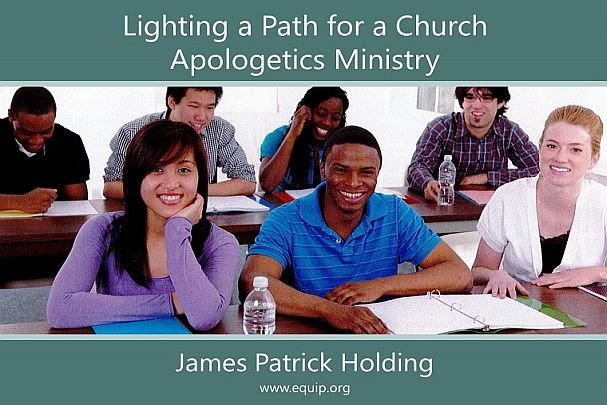This article first appeared in the Christian Research Journal, volume 32, number 2 (2009). For further information about the Christian Research Journal, click here.
One of the most satisfying aspects of apologetics ministry is hearing from people who ask permission to use ministry material to begin an apologetics teaching program in their own church. In these times when the Christian faith is increasingly under attack at all levels and discernment is scarce, sponsoring some sort of apologetics ministry at your home church can become an essential first line of defense for your friends, family, and neighbors. Sadly, not all churches have an interest in supporting apologetics ministry, and others, though willing to provide moral and prayerful support, may not be able to provide financial support for more extensive ministry projects. However, even under the most stringent circumstances, there is a great deal that can be done to assist your fellow church members in defense of their faith.
Lay the Foundation. Initially, you may have to explain to your fellow church members—or perhaps even pastoral staff!—what apologetics is, and provide a sound biblical basis for its practice. Most apologists cite passages at 1 Peter 3:15, Jude 3, and 2 Corinthians 10:5 for evidence of the practice of apologetics in the apostolic church. It is also helpful to note that early evangelism was based on the presentation of fact, and that potential converts were called to repentance based on the historical resurrection of Jesus Christ and the evidence of both His miracles and His fulfillment of Old Testament prophecy (see, e.g., Peter’s speech in Acts 2).1
Once a biblical basis for apologetics is established, the specific need for such ministry within your church and/or community should be demonstrated. An appeal on this basis can be made from both a positive and a negative perspective. From a negative perspective, church members and pastors can be awakened to the need for apologetics via awareness of crisis statistics indicating serious reductions in church membership and in professions of faith in Jesus Christ.
While there have been numerous analyses with varying theories concerning the cause of these defections from practicing faith, it is clear that whatever approach to this problem a church implements would need to incorporate apologetics as part of the antidote. As the noted apologist John Warwick Montgomery has observed, “The 21st century Apologist…needs to incorporate Apologetics into every aspect of his or her ministry: every sermon, every class, every evangelistic activity. We have woefully neglected our responsibility to train our young people in the solid case for Christianity, and then we wonder why they depart from the faith under the influence of secular university instruction.”2 Having excellent, solid reasons to believe the Christian faith is fundamental to maintaining a healthy worldview that is consistent with our observations and experience.
The apologist may also justify his or her ministry through the power of personal testimony. Testimony can be offered in both a negative and a positive light. It is not difficult to find what might be called “anti-testimonies” from persons professing to have formerly been Christians, who say that they abandoned their faith because of unanswered questions that a trained apologist could easily have resolved, but which pastors or other Christians they consulted were unable to answer.3 It may also be helpful (if not indeed provocative) to present samples of atheistic or skeptical literature critical of Christianity, in order to highlight a tangible aspect of the problem.
Finally, it can be beneficial to survey your fellow church members concerning any questions they may have had about the veracity of the Christian faith. I have found it effective, for example, to go around a room where a group is gathered, asking each member what they think the greatest challenges to their faith are, or what unresolved questions they have had about the Bible and Christianity. Few were unwilling to share their doubts and questions in a setting where others were doing the same.
Positively, the testimonies of those whose faith was strengthened by apologetics material, and who found themselves more motivated in their evangelism because of their newfound surety of faith, can also be powerful tools. People who believe in Christianity because they have solid reasons to think that it is true will provide a far more effective witness than people who believe merely because someone else told them to, or because they had some sort of subjective experience.
Build the Walls. Once the foundation has been established, the next step is to build a collection of resources for your church. If your church has an active library, you may be able to persuade library staff to purchase apologetics material; or perhaps you can purchase it yourself and donate it to the library. Obviously, a great deal will depend on the financial resources available. You may have to be content with providing the library with a set of bibliographies, listing books that members can read if they want more information on specific topics.
If you can add books to your church library, I would recommend giving priority to “gateway” apologetics works such as Lee Strobel’s Case series, or Hank Hanegraaff’s The Complete Bible Answer Book. More technical works by authors such as Ben Witherington or Craig Blomberg can be made as secondary purchases, or else can be listed as resources in bibliographies.
Printed materials are not your only potential resources. You may also be able to compile a roster of expert persons and organizations that church members can consult if they have questions. This may include an apologetics ministry such as the Christian Research Institute or a local seminary professor.
Have Some Class. With resources in place, it is time to design a curriculum for an apologetics class. One of the greatest temptations is to “overload” a course with information. We should keep our audience in mind. A class composed of teachers and church leaders can be presented with more detailed information than a class composed of lay church members.
In practice, I find that it is best to craft a lesson so that the most startling or interesting aspects of an issue are highlighted, and thereafter provide a bibliography for further reading. Thus, for example, in doing a lesson on claims that the story of Jesus was based on pagan Christ-figures, I will select some of the clearest and most outrageous claims to present in the lesson proper (e.g., “1 Corinthians 10:4 was copied from Mithraic scriptures”), and this will be sufficient to alert the student to the issue and firmly implant it in his or her memory.
A bibliography attached to lesson notes will tell the students where to go for more information, when and if they need it. Thereafter, if he or she, or a family member, encounters such claims (e.g., from the popular online movie Zeitgeist), they will know where to go for answers, without having to remember a virtual truckload of information from the lesson.
For classes for the average churchgoer, we should keep our primary focus on the defense and understanding of basic doctrines (the Atonement, the Resurrection, etc.) and major issues facing Christians in popular culture. If we teach other teachers or church leaders, a more advanced course of study is warranted, because these are the people that others look to for answers. Regrettably, it is precisely when leaders are unable to answer questions, and thereby assuage doubts, that Christians can enter into a cycle of discouragement and disillusionment in which they question their faith. This in turn can lead to a downward spiral in which the Christian loses motivation to evangelize or to serve in the Body of Christ.4
Stay in View. A final, necessary step involves not only building awareness within your church fellowship, but also maintaining it. As apologists, we should make it a priority to remain on top of “hot button” issues (e.g. the alleged “tomb of Jesus,” or more recently, the Bill Maher film Religulous) and broker information about them for our churches. Ideally, we should request that pastoral staff bring attention to such issues from the pulpit on Sunday morning, and promote more in-depth programs that can be presented at other times. We might also ask for permission to provide some sort of information in our weekly church bulletins.
The critical point is that when “hot button” issues emerge, they should not simply be swept under the rug. Inevitably, inactivity in apologetics makes for ineffectiveness in evangelism. If, for example, we cannot answer questions about a film like Religulous, we foster an impression of Christians as being unwilling or unable to articulate or defend why they or anyone else should become a Christian.
As Nancy Pearcy has noted:
To be effective in equipping young people and professionals to face the challenges of a highly educated secular society, the church needs to redefine the mission of pastors and youth leaders to include training in apologetics and worldview.…Pastors must once again provide intellectual leadership for their congregations, teaching apologetics from the pulpit. Every time a minister introduces a biblical teaching, he should also instruct the congregation in ways to defend it against the major objections they are likely to encounter. A religion that avoids the intellectual task and retreats to the therapeutic realm of personal relationships and feelings will not survive in today’s spiritual battlefield.5
The growth of challenges to our faith, and the easy accessibility of information that challenges us, makes Pearcy’s summons a particularly urgent one. When it comes to educating Christians in the defense of their faith, it is time to be proactive instead of reactive.
— James Patrick Holding
James Patrick Holding is President of Tekton Apologetics Ministries and author of Shattering the Christ Myth (Xulon Press: 2007).
Notes
- See James Patrick Holding, “When Apologetics Was Evangelism,” Christian Research Journal 26, 1 (2003): 10–11, 51.
- John Warwick Montgomery, “Defending the Hope That Is in Us: Apologetics for the 21st Century,” http://www.jwm.christendom.co.uk/unpublished_essay.html (accessed September 12, 2008).
- See James Patrick Holding, “Witnessing to Those Fallen from Faith,” Christian Research Journal 28, 1 (2005): 10–11, 40.
- On the cycle of doubt and disillusionment, see C. Michael Patton, “Leaving (Christ)ianity: An Evangelical Epidemic,” Reclaiming the Mind, http://www.reclaimingthemind.org/blog/2008/07/ leaving-christianity%E2%80%93-an-evangelical-epidemic/ (accessed September 15, 2008).
- Nancy R. Pearcy, Total Truth: Liberating Christianity from Its Cultural Captivity (Wheaton, IL: Crossway Books, 2005), 127.









